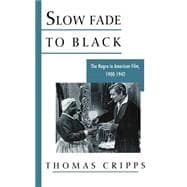
Note: Supplemental materials are not guaranteed with Rental or Used book purchases.
Purchase Benefits
What is included with this book?
| The Unformed Image: The Afro-American in Early American Movies | p. 8 |
| The Year of The Birth of a Nation | p. 41 |
| Two Early Strides toward a Black Cinema | p. 70 |
| Black and White in Hollywood | p. 90 |
| The Silent Hollywood Negro | p. 115 |
| Uncle Tom Was a "Bad Nigger" | p. 150 |
| The Black Underground | p. 170 |
| Two Cheers for the "Indies" | p. 203 |
| "Better Than White Voices" | p. 219 |
| Black Music, White Movies | p. 236 |
| The Hollywood Negro Faces the Great Depression | p. 263 |
| Meanwhile Far Away from the Movie Colony | p. 309 |
| The Politics of Art | p. 349 |
| Notes | p. 391 |
| Index | p. 435 |
| Table of Contents provided by Syndetics. All Rights Reserved. |
The New copy of this book will include any supplemental materials advertised. Please check the title of the book to determine if it should include any access cards, study guides, lab manuals, CDs, etc.
The Used, Rental and eBook copies of this book are not guaranteed to include any supplemental materials. Typically, only the book itself is included. This is true even if the title states it includes any access cards, study guides, lab manuals, CDs, etc.